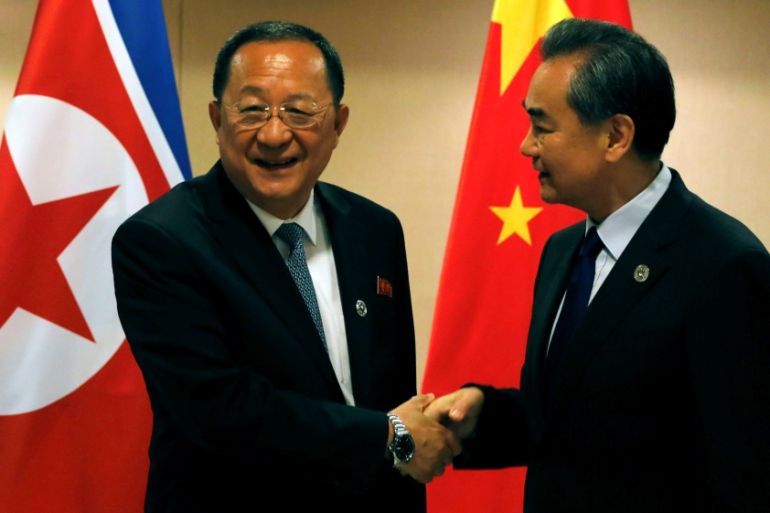China to close North Korean firms under UN sanctions
Companies and joint ventures with Chinese firms have 120 days to close from the September 11 adoption of UN resolution.

Beijing has ordered North Korean-owned businesses in China to close by January, cutting foreign revenue for Pyongyang under United Nations sanctions imposed over its nuclear and missile programmes.
China’s commerce ministry said on Thursday that companies, including joint ventures with Chinese firms, have 120 days to close from the date the UN resolution was adopted on September 11.
The sanctions spare, on a case by case basis, entities involved in non-commercial activities or public utility infrastructure projects that do not generate profits.
OPINION: Should you be worried about North Korea?
China is North Korea’s main trading partner, making Beijing’s cooperation essential to the success of sanctions imposed to stop Pyongyang’s pursuit of weapons technology.
China has long been North Korea’s diplomatic protector but has gone along with the latest penalties out of growing frustration with the government of leader Kim Jong-un.
The latest round of sanctions approved by the UN Security Council bans member countries from operating joint ventures with North Korea.
The sanctions also ban sales of natural gas to North Korea and purchases of its textile exports, another key revenue source. They order other nations to limit fuel supplies to North Korea.
China, which provides the bulk of North Korea’s energy supplies, announced on Saturday that it would cut off gas and limit shipments of refined petroleum products, effective January 1.
It made no mention of crude, which makes up the bulk of Chinese energy supplies to North Korea and is not covered by the UN sanctions.
![Tourists in China look across to the North Korea border from Tumen [File: Reuters]](/wp-content/uploads/2017/09/b3e73b899cd94caba4ae7127d72edf9b_18.jpeg)
US pressure
With the latest UN sanctions, North Korea could lose up to $800m a year from textile exports, and another $500m a year from its overseas workers, according to estimates by the South China Morning Post.
The Hong Kong-based newspaper also reported that in China, North Korean businesses, mostly in the restaurant industry would be affected. There are an estimated 100 restaurants run by North Koreans, including 26 in the capital Beijing.
Between 2016 and 2015, North Koreans have made a total of $22m in direct investments in China.
China also has banned imports of North Korean coal, iron and lead ore, and seafood since early September.
In August, China banned North Korean firms and individuals from establishing new companies in its territory following a separate set of sanctions.
On Thursday, the Ministry of Commerce defended its recent imports of North Korean coal as permitted by UN sanctions.
|
|
A ministry spokesman, Gao Feng, said imports that were reported in August trade data were allowed by a “grace period” for goods that arrived before the UN ban took effect.
The imports are “in line with the (UN) resolution,” Gao said.
The United States has pressed China to use its economic leverage to force North Korea into giving up its nuclear ambitions.
US Secretary of State Rex Tillerson will visit Beijing this weekend for talks with China’s top diplomat, Yang Jiechi, and Foreign Minister Wang Yi.
Tillerson will discuss the North Korean nuclear tensions, trade issues and President Donald Trump’s planned trip to China in November, the US State Department said.
Trump’s tour will also take in regional allies Japan and South Korea.